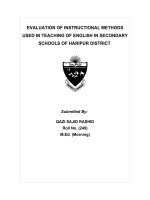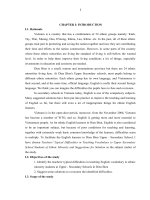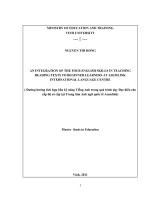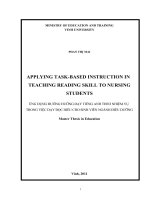Simple sentence in teaching
Bạn đang xem bản rút gọn của tài liệu. Xem và tải ngay bản đầy đủ của tài liệu tại đây (126.84 KB, 10 trang )
WRITE AN ASSIGNMENT( IN 1000 WORDS) TO EXPRESS YOUR
KNOWLEDGE OF THE SIMPLE SENTENSE AND RELATE IT TO
TEACHING AT SCHOOL
TABLE OF CONTENT
TABLE OF CONTENTS.................................................................................i
INTRODUCTION...........................................................................................1
DISCUSSION..................................................................................................2
I. Definition and Classification of Simple sentence..............................2
1.1. Definition of Simple sentence........................................................2
1.2. Types of Simple Sentence..............................................................2
II. Characteristics of simple sentence....................................................3
2.1. A simple sentence is not always a short basic sentence.................3
2.2. A simple sentence could also have a compound predicate............3
III. Difference between Simple, Compound and Complex sentence. .4
2.3. Difference between simple sentence and compound sentence.......4
2.4. Difference Between Simple and Complex Sentence......................5
IV. Using Simple sentence to teach........................................................6
CONCLUSION................................................................................................8
REFERENCES................................................................................................9
i
INTRODUCTION
Sentences are just the source of expressing our emotions. Now what
exactly a sentence is, it is a group of words put in an order to give a
meaningful result. There may be multiple ways to write a sentence while
maintaining the rules of grammar, but younger students require a set structure
for the simple sentences they learn. These youngsters certainly don’t need to
learn how to express the same idea in active and passive voice until they’re
older. Grasping the importance of a simple sentence, Writer chosen the topic "
Knowledge of the simple sentense and relate it to teaching at school"
1
DISCUSSION
I. Definition and Classification of Simple sentence
1.1. Definition of Simple sentence
A simple sentence (also known as an independent clause) is the basic
building block of ALL sentences. A simple sentence must have a main
verb/verb group and a subject, AND it must make complete sense on its own.
When you check for correct sentence structure, you should always begin by
identifying the simple sentence
Examples of Simple Sentences
Below are examples of simple sentences.
I cannot drink warm milk.
A day without sunshine is like night.
Only the mediocre are always at their best. (Novelist Jean Giraudoux)
Reality continues to ruin my life. (Cartoonist Bill Watterson)
1.2. Types of Simple Sentence
There are two different types of simple sentence. Depending upon
structure, these include:
Compound Verbs and Compound Subjects
Some sentences have a single subject and two or more verbs. Other
sentences have a single verb and two or more subjects. For example:
The dog barked and ran (Compound verb)
Arnold and Juan play cricket every evening. (Compound noun)
The italicized words in the above simple sentences are compound verbs, or
compound nouns, respectively.
Single Subject and a Single Verb
2
This type of simple sentence has only one subject and one verb. For
example:
The staff performed well.
A white shirt always looks sharp.
II. Characteristics of simple sentence
2.1. A simple sentence is not always a short basic sentence
A simple sentence could have a compound subject. For example:
Jack likes walking.
(This is a simple sentence with one simple subject ("Jack").)
Jack and Jill like walking.
(This is a simple sentence with a compound subject made up of two simple
subjects ("Jack" and "Jill").)
2.2. A simple sentence could also have a compound predicate
It happens when two or more verbs share the same subject. For example:
Jack likes fishing.
(This is a simple sentence with a normal predicate, i.e., there's just one main
verb ("likes").)
Jack likes fishing but hates hunting.
(This is a simple sentence with a compound predicate. The subject "Jack" is
the subject of two verbs ("likes" and "hates").)
Jack likes walking and fishing but hates running and hunting.
(This is still a simple sentence with a compound predicate. The subject "Jack"
is still the subject of two verbs ("likes" and "hates"), but you can see how a
simple sentence could start to get quite busy.)
3
Example of a simple sentence with a compound subject, a compound
predicate, and direct objects with more than one item.
Jack and Jill like walking and fishing but hate running and hunting.
(This is still a simple sentence. There are no dependent clauses.)
Example of a busy simple sentence:
Wolves and European brown bears developed a fear of humans too late
and became extinct in the British wilds and the forests and mountains of
Europe in medieval times.
III. Difference between Simple, Compound and Complex sentence
2.3. Difference between simple sentence and compound sentence
Being able to identify a simple sentence helps with comma placement.
Writers are often unsure when to use a comma before words like "and," "or,"
and "but" (called conjunctions).
For examples:
Jack likes chicken and loves Nando's.
Jack likes chicken but hates turkey.
(These are both examples of simple sentences with compound predicates. In
each example, there is one subject governing two verbs. Note that there is no
comma before the "and" or the "but.")
Compare the two examples above with these sentences:
Jack likes chicken, and he loves Nando's.
Jack likes chicken, but he hates turkey.
(These look similar, but they are not simple sentences with compound
predicates. There are two subjects ("Jack" and "he"), each governing its own
verb. These are examples of compound sentences not simple sentences with
4
compound predicates. Each sentence features two independent clauses, not
one.")
2.4. Difference Between Simple and Complex Sentence
Difference between simple and complex sentence is one of the basics
that one should learn to be a good writer or speaker in English language.
Written or spoken English is made up of words strung together to make
meaningful sentences.
• A simple sentence has one subject and a verb and expresses a single idea. A
simple sentence can stand on its own.
• A complex sentence is formed joining an independent clause (that can stand
on its own) with a dependent clause using a conjunction.
• Complex sentences have two or more verbs, two or more clauses and
express more than one idea.
Simple sentence:
Simple sentences have only one verb.
They convey one main idea.
Complex sentence:
Simple sentences have only one verb and convey one main idea.
IV. Using Simple sentence to teach
Relating to teaching at school: We use this knowledge to teach, test and
assess our student's grammar skill by giving these 10 questions:
1. Is this sentence a simple sentence?
Go clean your room!
O Yes
O No
5
2. Is this sentence a simple sentence?
Don't Go!
O Yes
O No
3. Is this sentence a simple sentence?
Lisa got sent to the principal's office because she was late.
O Yes
O No
4. Select the simple sentences.
This is a complex sentence.
O I brought my umbrella with me O I want a new cat, but I haven't
in case it rains.
saved enough money yet.
O
O This is a complex sentence.
Are you going to the party,
Tom?
5. Is this sentence a simple sentence?
I don't know why she did that.
O Yes
O No
6. Chose the simple sentence
O In Greek mythology, Athena is the goddess of wisdom.
O Athena is the goddess of wisdom, so she is an important figure in Greek
mythology.
7. A simple sentence has...
Two independent clauses
6
O Two independent clauses
O No compound verbs
O One dependent clause
O One independent clause
8. Is this sentence a simple sentence?
We waited for her arrival until we left for dinner.
O Yes
O No
9. Is this sentence a simple sentence?
Long-ago people had no cell phones.
O Yes
O No
10. Select the simple sentences.
I find doing work on my laptop to be quite enjoyable.
O I find doing work on my laptop O Please come here!
to be quite enjoyable.
O The kitten was warm and fuzzy. O Shawn is a great writer, but his
spelling is terrible.
7
CONCLUSION
Simple sentences in communications are generally easy to understand,
as they are short and to the point. Too many simple sentences, however, are
likely to appear rather simplistic and may end up requiring more words to say
what could be said in fewer compound statements.
Generally, clean communications makes good use of simple sentences,
although compound sentences may also be kept clean by reducing clause size.
A final simple sentence after the detail of a compound sentence can
summarize the key point and add impact.
8
REFERENCES
Vandana Kakaria ,Importance of Sentence Formation.
9









